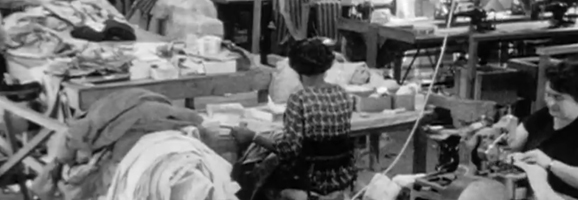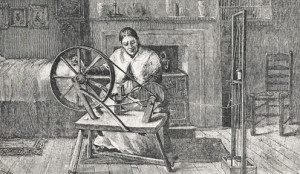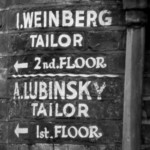
The area of the East End known as Spitalfields has been home to clothing manufacturing businesses (often referred to as ‘The Rag Trade’) for over 250 years. Started primarily by the Huguenots, religious refugees from Eighteenth century France, the Rag Trade has dominated the area ever since.
Spitalfields represented the most concentrated Huguenot settlement in England and it was said that you were as likely to hear French being spoken in the streets of the East End as the mother tongue of English. In fact, the amount of Huguenot migration from France was so great (estimated at almost twenty five thousand individuals – a huge amount given the population at the time) that it is believed that amongst the current population in the South East of England, more than 90% may have Huguenot ancestors.

The Huguenots were talented weavers who became very successful and their businesses soon boomed. They invested the money they made to construct the tall, impressive town houses that line the streets of the Brick Lane area (for a chance to glimpse into their world, see the article on Dennis Severs House on this website). With their long windows to let in the maximum amount of light, a factor essential for a weaver, together with their high ceilings, these properties are now highly sought after.
By the nineteenth century the weavers had long gone (primarily due to the joint factors of employment restrictions and mechanisation) and the properties had started to fall into disrepair. The once grand Huguenot homes were then turned into lodging houses where London’s poorest and most desperate could spend the night for a penny. Those who could not even afford the cost of a bed would end up sleeping whilst sitting upright on a bench, their tired and weary bodies held in place by a rope.
The properties became filthy, flea-ridden doss houses where petty crime was rife. Home to gin soaked Whitechapel prostitutes, these sorry individuals would have slept in these common lodging houses whilst Jack the Ripper committed his horrendous murders in the streets outside.
As the French weavers moved out another group of settlers began to move in. Following the assassination of Tsar Alexander II in 1881, the persecution of Jews in Russia became even fiercer, and a wave of pogroms swept across Russia and neighbouring countries. Many Jewish families fled Eastern Europe between 1881 and 1914, prompted by economic hardship and increasingly ferocious persecution and moved to the East End for a fresh start.
A large number of Jews who landed in England were actually intending to make their way to America, but about 120,000 stayed in this country. Attracted by the East End’s reputation as a place for cheap living, (and by the fact that it had been home to a Jewish population in previous decades), large numbers of Jews settled in Spitalfields, often finding work in the ‘rag trade’. Indeed, by the end of the Nineteenth century, Jews represented about 95 per cent of the population in the Wentworth Street district of Spitalfields and had also settled around Whitechapel, Aldgate and Mile End.
of Jews who landed in England were actually intending to make their way to America, but about 120,000 stayed in this country. Attracted by the East End’s reputation as a place for cheap living, (and by the fact that it had been home to a Jewish population in previous decades), large numbers of Jews settled in Spitalfields, often finding work in the ‘rag trade’. Indeed, by the end of the Nineteenth century, Jews represented about 95 per cent of the population in the Wentworth Street district of Spitalfields and had also settled around Whitechapel, Aldgate and Mile End.
Eventually, the Jewish community moved further out to the suburbs, such as Golders Green and Hendon, and in their wake, the clothing trade was taken over by another ethnic group, that of Bengali Muslims, who remain to this day. Indeed a visit to Brick Lane nowadays finds the senses assaulted with the sights, sounds and smells of the Indian sub-continent.
